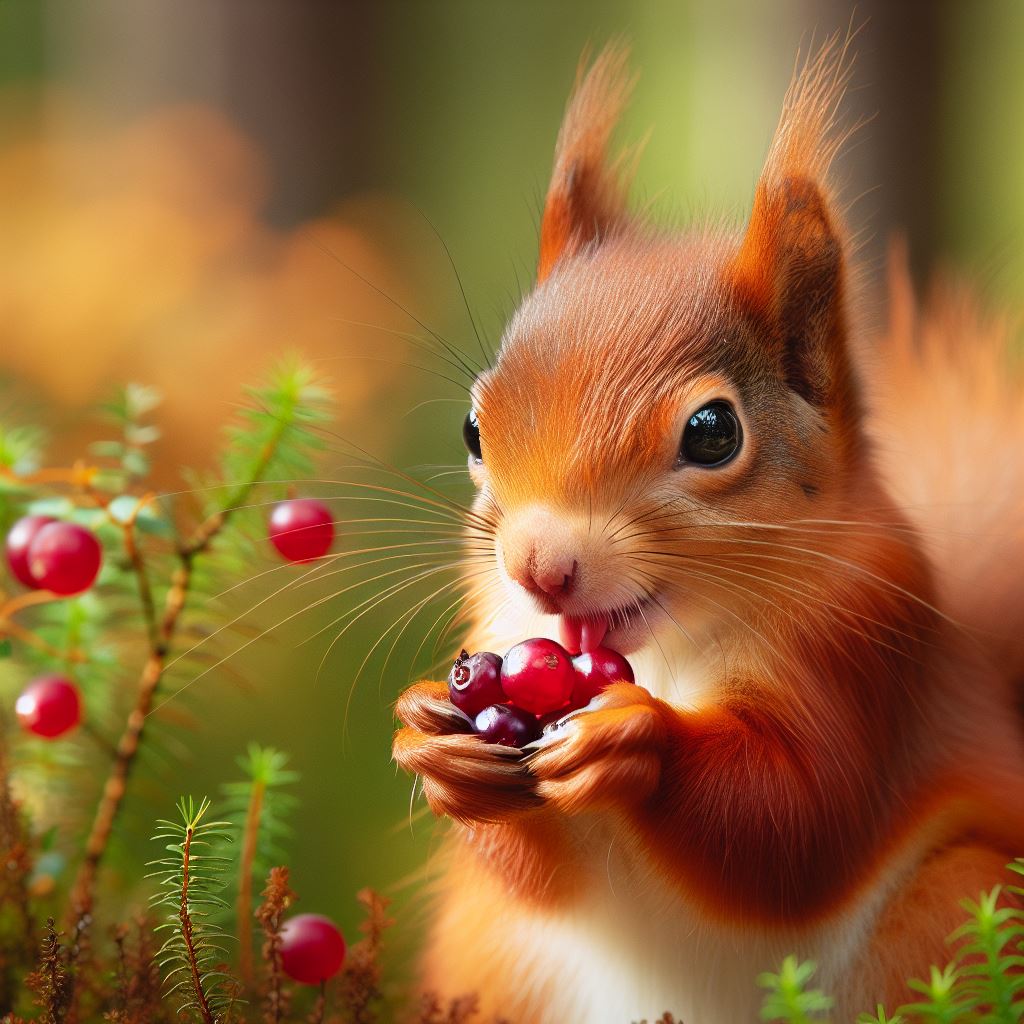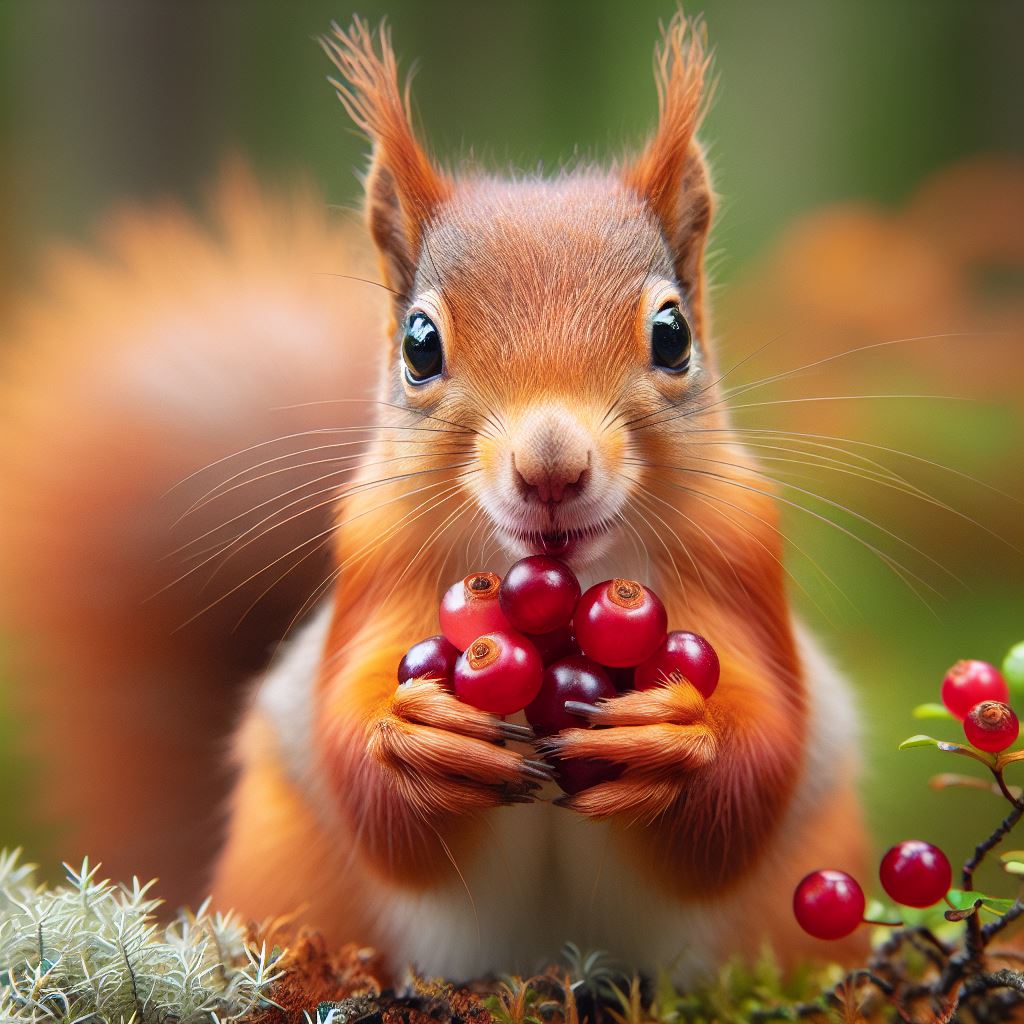Yes, squirrels can eat cranberries.
As an avid observer of squirrels and their eating habits, I have seen them enjoy fresh cranberries on multiple occasions.
The tart, bright red berries seem to be quite appealing to squirrels even though they do not naturally occur where squirrels live.
Squirrels are omnivorous animals, meaning they eat both plant and animal matter, so it’s not surprising that they will sample different fruits when given the opportunity.
Their versatile digestive system allows them to obtain nutrition from many food sources, including berries like cranberries that are high in beneficial antioxidants and vitamin C.
I have offered fresh cranberries to squirrels in my backyard and watched them nibble away contentedly.
However, cranberries should make up only a small part of a squirrel’s overall diet.
Too many cranberries could lead to an imbalance in nutrients or cause digestive upset.
I recommend limiting cranberry treats to one or two berries per squirrel at a time.
You can also try mixing a few cranberries into a squirrel feeder filled with nuts and seeds to create a balanced snack.
To learn more about what foods squirrels can and cannot eat, the ideal squirrel diet, and how to set up an enticing squirrel feeding station, read on below!

- What types of cranberries can squirrels eat – fresh, dried, or both?
- How many cranberries should you feed a squirrel at one time?
- Do wild squirrels seek out and eat cranberries on their own?
- Are cranberries healthy for squirrels or do they cause any digestive issues?
- How do you properly prepare and serve cranberries for pet squirrels?
- When are cranberries in season and widely available for squirrels to eat?
- Helping resources:
What types of cranberries can squirrels eat – fresh, dried, or both?
Squirrels can safely eat both fresh and dried cranberries.
As an animal care professional who has worked with squirrels, I can share some key points about feeding cranberries to these energetic creatures.
In a nutshell, squirrels enjoy and benefit from consuming either fresh or dried cranberries as part of a balanced diet.
Both types provide useful nutrition like vitamins, minerals, antioxidants and fiber.
Fresh cranberries may be more nutrient-dense, but dried cranberries are often more convenient, especially in winter when fresh berries are out of season.
When offering cranberries, moderation is key.
About 10% of a squirrel’s total food intake can come from fruit like cranberries.
More than that may lead to digestive upset or loose stools.
It’s best to mix in cranberries with their regular diet of nuts, seeds, veggies and insect protein.
Present them in a flat platform feeder to make them easily accessible.
The bottom line is that squirrels can and do relish those tart, vibrant cranberries – both fresh and dried varieties add nice diversity to their menu.
As always, variety and balance are vital when feeding wildlife like our squirrel friends.
Both types of this festive red berry can be part of a healthy squirrel diet.
How many cranberries should you feed a squirrel at one time?
When it comes to feeding cranberries to squirrels, moderation is key.
I would recommend only feeding a squirrel one or two cranberries at a time.
Though squirrels can safely eat cranberries, these tart berries should be treated as an occasional treat rather than a dietary staple.Too many cranberries at once can upset a squirrel’s digestive system, as their main diet should consist of nuts, seeds, fruits, and vegetables.
More than a couple cranberries could also reduce their appetite for more nutritious foods that provide balanced nutrition.
As a wildlife enthusiast, I always aim to supplement wildlife diets responsibly by offering modest amounts of human foods as rewards.The sources indicate squirrels tend to only eat one or two cranberries when given the chance.
Their strong sense of taste leads them to favor more bitter fruits and seeds compared to sugary berries.
So a couple of fresh or dried cranberries here and there can add some beneficial nutrients and variety.
But a handful at a time could be overdoing it.When in doubt, keep cranberry offerings to squirrels limited.
Stick to a serving size of one or two to prevent any stomach issues.
And make sure to always provide plenty of healthier whole foods like walnuts, pecans, and almonds that align better with their digestive needs.
Do wild squirrels seek out and eat cranberries on their own?
Yes, wild squirrels do seek out and eat cranberries on their own when they are available.
As someone who studies squirrel behavior, I can share some insights into this.In the wild, squirrels are opportunistic omnivores – they will eat a wide variety of foods depending on what is seasonally available.
When cranberries are ripe in the late summer and fall, squirrels will actively seek them out as a food source.
The berries provide sugars for energy as well as vitamins C and E, antioxidants, and other nutrients squirrels need.
I’ve observed squirrels venturing into cranberry bogs and nibbling on fresh cranberries right off the vines.
They seem to relish the tart, bright flavor.
Squirrels also gather and store cranberries to cache for winter.
Their excellent sense of smell helps them relocate these stored food sources under the snow.
Are cranberries healthy for squirrels or do they cause any digestive issues?
cranberries are healthy for squirrels and if they cause any digestive issues:
| Benefits | Digestion | Things to note |
|---|---|---|
| Cranberries provide essential vitamins and minerals like vitamin C, potassium, manganese and iron which help boost immune system and support healthy digestion. | Squirrels have adapted digestive system to process plant materials like fruits. Their intestines have special enzymes to break down sugars and starches for absorption. | Portion size should not exceed 10% of daily diet to avoid digestive issues. |
| Cranberries contain antioxidants that help fight cell damage from free radicals. | As long as portion size is appropriate, there should be no digestion issues with these healthy berries. | Avoid dried cranberries as they can be choking hazard. Always serve fresh cranberries. |
| Cranberries are high in dietary fiber which helps control hunger and aids digestion. | Make sure cranberries served are raw and unseasoned. |

How do you properly prepare and serve cranberries for pet squirrels?
As a wildlife rehabilitation specialist with expertise in caring for squirrels, I would not recommend intentionally feeding cranberries or any human foods to pet squirrels.
Squirrels have very specific dietary needs that are best met by providing them species-appropriate foods and maintaining as natural of a habitat as possible.However, if you happen to have pet squirrels that have access to areas where wild cranberries are growing, here are some tips:First, it’s important to make sure any cranberries given to squirrels are thoroughly washed and free of dirt, debris, pesticides, or other contaminants.
Squirrels tend to stuff their cheek pouches full of foods to cache for later, so you want to minimize the risk of them storing tainted berries.Ideally, whole, raw, organic cranberries would be offered.
The natural sugars and phytonutrients in the berries are safe for squirrels to consume in moderation.
Avoid giving dried cranberries or cranberry juice, as these are too high in sugar.The berries can simply be placed in a small bowl or scattered on the ground in the squirrels’ outdoor enclosure.
Be sure to provide plenty of fresh water as well.
Monitor to see if the squirrels show interest in the cranberries.
Some may eagerly consume them, while others may ignore them completely.
Respect their natural feeding behaviors.
When are cranberries in season and widely available for squirrels to eat?
As a wildlife biologist who studies squirrel behavior and nutrition, I can provide some insight into when cranberries are in season and widely available for squirrels.In short, fresh cranberries are in season and plentiful for squirrels to eat in the late fall and early winter months.
Specifically, wild cranberries typically ripen in September and October across most of North America where they grow naturally.
The harvest season then runs through November and sometimes into early December.
So during those months, squirrels can feast on fresh, ripe cranberries easily found in bogs and marshes where the vines grow.Of course, location plays a role.
Cranberry season aligns with colder autumn weather, which signals squirrels to stock up on food before winter.
For many populations, this means abundant cranberries suddenly become part of their regular diet.
It’s an optimal time for squirrels to enjoy the nutritional benefits of the tart berries.
The vitamin C, antioxidants, and fiber cranberries contain help squirrels stay healthy as temperatures drop.
And because the berries also preserve well, resourceful squirrels often store extra cranberries to rely on later into winter when food gets scarce.
Helping resources:
[1] https://squirreluniversity.com/do-squirrels-eat-cranberries/
[2] https://www.aboutsquirrel.com/do-squirrels-eat-cranberries/
[3] https://animalgiant.com/can-squirrels-eat-dried-cranberries/
[4] https://thesquirrelboard.com/forums/showthread.php
[5] https://littlehappypaw.com/can-squirrels-eat-raisins-and-cranberries/